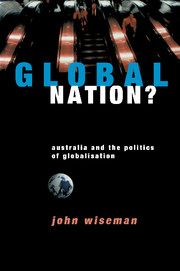Book contents
- Frontmatter
- Contents
- Abbreviations
- Acknowledgments
- 1 Introduction: Australia and the Politics of Globalisation
- 2 Breaking the Spell? Understanding Globalisation
- 3 Transforming the Global Economy? Trade, Capital and Power in the Late Twentieth Century
- 4 Onto the Global Racetrack? Globalising the Australian Economy
- 5 The Price of Competitiveness? The Social Impact of Globalisation on Australia
- 6 Wired to the World? Australia and the Globalisation of Media and Information Technologies
- 7 Nowhere to Hide? Australia in the Global Environment
- 8 Where in the World? Transforming Australian Political Relationships and National Identities
- 9 Alternative Strategies? Thinking and Acting Globally and Regionally
- 10 Alternative Directions? Thinking and Acting Locally and Nationally
- 11 Conclusion
- Notes
- Bibliography
- Index
6 - Wired to the World? Australia and the Globalisation of Media and Information Technologies
Published online by Cambridge University Press: 20 May 2010
- Frontmatter
- Contents
- Abbreviations
- Acknowledgments
- 1 Introduction: Australia and the Politics of Globalisation
- 2 Breaking the Spell? Understanding Globalisation
- 3 Transforming the Global Economy? Trade, Capital and Power in the Late Twentieth Century
- 4 Onto the Global Racetrack? Globalising the Australian Economy
- 5 The Price of Competitiveness? The Social Impact of Globalisation on Australia
- 6 Wired to the World? Australia and the Globalisation of Media and Information Technologies
- 7 Nowhere to Hide? Australia in the Global Environment
- 8 Where in the World? Transforming Australian Political Relationships and National Identities
- 9 Alternative Strategies? Thinking and Acting Globally and Regionally
- 10 Alternative Directions? Thinking and Acting Locally and Nationally
- 11 Conclusion
- Notes
- Bibliography
- Index
Summary
If you really want to guarantee democracy in a nation, you need three things: you need a vigorous and open parliamentary system; you need an incorruptible judiciary; and you need a vigilant, on occasions cranky and profoundly sceptical media.
John HowardMediacracy is not contradictory to democracy because it is as plural and competitive as the political system is. That is not much.
Manuel CastellsThe new reality of international media is driven more by market opportunity than by national identity.
Steven Ross, Former head of Time WarnerNovember 1997. A Telstra executive celebrates the first international stock-market listing of the partly privatised Telstra by ringing the bell to start trading on the New York stock exchange. In Australia, Telstra shareholders laugh and cheer as the price of their shares soar. Government Ministers are delighted. Financial journalists can hardly contain their glee. Foxtel shareholders are grinning too, given the Pay TV partnership between Telstra and Foxtel. Everyone seems to be beaming, even the Australian and Chinese school children chatting to each other on the Internet in Telstra's saturation advertisements. Here is Telstra ‘making it easier’ by ‘bringing the world together’.
This is the happy face of the globalised information economy. The technological wizardry of digitalisation and fibre optics will keep bringing people closer; deregulation, competition and privatisation will ensure falling costs and rising profits; the free flow of information will bring democracy, the free market and Coca-Cola to every corner of the globe.
- Type
- Chapter
- Information
- Global Nation?Australia and the Politics of Globalisation, pp. 70 - 85Publisher: Cambridge University PressPrint publication year: 1998



